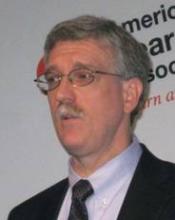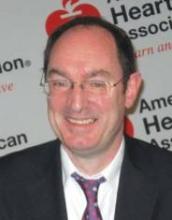LOS ANGELES – The recombinant vasoactive peptide hormone serelaxin showed the potential to be a breakthrough therapy for acute heart failure in a phase III randomized trial.
In the Relaxin in Acute Heart Failure (RELAX-AHF) trial, serelaxin brought greater dyspnea relief than standard treatment plus placebo. It also markedly reduced the risk of worsening heart failure during the index hospitalization, significantly shortened ICU and total hospital lengths of stay, improved biomarkers, and displayed a benign safety profile. Most impressive of all, serelaxin was associated with a highly significant 37% reduction in both cardiovascular and all-cause mortality at follow-up 6 months after administration of a 48-hour infusion, study co-principal investigator Dr. John R. Teerlink reported on Nov. 6 at the annual scientific sessions of the American Heart Association.
These benefits mirror those seen earlier in the phase II Pre-RELAX-AHF study (Lancet 2009;373:1429-39). That study showed an all-cause mortality reduction in the subgroup randomized to the same dose of serelaxin used in the phase III trial, added Dr. Teerlink, professor of medicine at the University of California, San Francisco.
Serelaxin is recombinant human relaxin-2, which is present in both men and women. The hormone rises to pharmacologic levels during pregnancy. During that time, it promotes increased cardiac output, renal blood flow, and arterial compliance.
"Those are exactly the kinds of changes we’d like to see in patients with acute heart failure," Dr. Teerlink explained in describing the rationale for developing the hormone as a novel cardiovascular medication.
Heart failure experts who commented on RELAX-AHF were unanimous in their conviction that the study persuasively demonstrated that serelaxin reduces breathlessness and other signs and symptoms of acute heart failure. They were more cautious regarding the observed mortality benefit.
"My own feeling about this is that it would be very nice to see this finding replicated. If we did replicate this finding it would be an extraordinary advance in the management of acute heart failure, for which we have no disease-modifying or lifesaving therapies," said Dr. John McMurray, professor of medical cardiology at the University of Glasgow.
RELAX-AHF was an international double-blind study that enrolled 1,161 patients hospitalized for acute heart failure. All had dyspnea at rest or with minimal exertion, pulmonary congestion, mild to moderate renal insufficiency, elevated brain natriuretic peptide levels, and a systolic blood pressure greater than 125 mm Hg despite having received at least 40 mg of intravenous furosemide or its equivalent shortly before enrollment. Participants were randomized to intravenous serelaxin at 30 mcg/kg per day for 48 hours or placebo on top of standard management.
The results: The serelaxin-treated group experienced a 19% improvement in the primary end point of patient-reported dyspnea to day 5. They also had a 30% reduction in the relative risk of worsening heart failure events up to day 14, despite roughly 25% less use of intravenous diuretics and other vasoactive drugs than in the placebo group. The average length of the initial hospital stay was 9.6 days in the serelaxin group, and nearly a full day longer at 10.5 days in controls. The serelaxin group averaged 3.5 days in the ICU or coronary care unit, 0.4 days less than the placebo group.
They were less likely than controls to experience a significant rise in creatinine or troponin T at day 2, and more likely to have a substantial decrease in NT-proBNP and liver enzymes.
But the head-turning result was the cardiovascular death rate through day 180: 9.5% with placebo compared with 6.0% with serelaxin, for a 37% reduction in risk. The number of patients who needed to be treated with serelaxin for 48 hours in order to prevent one additional cardiovascular death was 29. All-cause mortality was reduced to a similar extent, with an 11.3% rate in controls, compared with 7.3% with serelaxin.



